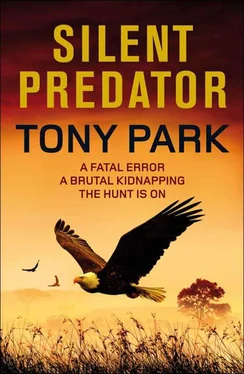Tony Park - Silent Predator
Здесь есть возможность читать онлайн «Tony Park - Silent Predator» весь текст электронной книги совершенно бесплатно (целиком полную версию без сокращений). В некоторых случаях можно слушать аудио, скачать через торрент в формате fb2 и присутствует краткое содержание. Жанр: Триллер, на английском языке. Описание произведения, (предисловие) а так же отзывы посетителей доступны на портале библиотеки ЛибКат.
- Название:Silent Predator
- Автор:
- Жанр:
- Год:неизвестен
- ISBN:нет данных
- Рейтинг книги:5 / 5. Голосов: 1
-
Избранное:Добавить в избранное
- Отзывы:
-
Ваша оценка:
- 100
- 1
- 2
- 3
- 4
- 5
Silent Predator: краткое содержание, описание и аннотация
Предлагаем к чтению аннотацию, описание, краткое содержание или предисловие (зависит от того, что написал сам автор книги «Silent Predator»). Если вы не нашли необходимую информацию о книге — напишите в комментариях, мы постараемся отыскать её.
Silent Predator — читать онлайн бесплатно полную книгу (весь текст) целиком
Ниже представлен текст книги, разбитый по страницам. Система сохранения места последней прочитанной страницы, позволяет с удобством читать онлайн бесплатно книгу «Silent Predator», без необходимости каждый раз заново искать на чём Вы остановились. Поставьте закладку, и сможете в любой момент перейти на страницу, на которой закончили чтение.
Интервал:
Закладка:
‘Good farming country,’ Sannie said. ‘I remember the fruit and vegetables here were some of the best I’ve ever had. The greenest lettuces, the reddest tomatoes you’ll ever see.’
Here and there the seemingly endless verdant farmlands were dotted with white houses with red roofs that looked like terracotta tiles. It was only later when they passed closer to one such farmhouse that Tom saw the roof was actually corrugated asbestos painted to look like tiling. It was a little piece of imitation Portugal, erected by long-gone colonists who must have pined for the far-off homeland they were feeding with the rich soil of Africa and the sweat of her people.
In the small towns they whizzed through were more signs of the old rulers’ influence: signs in Portuguese, Catholic cathedrals, stout concrete buildings of the colonial administration, and clusters of merchants’ villas with a distinct Mediterranean flavour. Some of the houses were freshly painted in pale pastels — more faux Europe — while others bore the bullet holes and black scorch marks of the post-colonial orgy of violence.
They passed a small mosque with a stunted, pointed minaret which was more a gesture to Islam than a tower from which to call the faithful to prayer. It made Tom think about the men they were pursuing. He was assuming they were Islamic fundamentalist terrorists, though he had no proof of their motive, cause or identity at this stage, beyond one man’s facial features. As he reminded himself to keep an open mind, the enormity of the task — the probable futility of their race across a foreign country with no support, no back-up — hit him like a bullet in the chest.
On the edge of the canal beside the road, life went on. Women in bright wraps washed themselves and their babies in soapy plastic washing bowls; small boys dived off bridges; men fished with long reed poles with fishing line tied to the ends. They passed a man in a suit and a cowboy hat riding a bicycle, and a new Land Cruiser driven by a fat, waving Portuguese farmer.
‘Some of the old farmers from the colonial days are returning, and there are white Zimbabwean farmers here too. They were kicked off their own land by their government, which was once allied to the ruling party here in Mozambique. That’s Africa for you,’ Sannie said.
Tom shook his head.
‘What is it?’ Sannie asked. ‘You’re looking grim.’
‘You don’t need to be here, Sannie.’
‘Yes I do.’
They were silent for a few seconds as they both considered the implications of that, but Tom finally broke their reverie.
‘We don’t have a chance in hell, do we?’
‘Probably not.’ She took a sip from a can of Coke and handed it to him. ‘But there’s nothing else we can do.’
14
Bernard Joyce had spent the better part of eight years at sea. He had lived for the wide expanses of empty ocean, even though he was under it for most of the time. Now he prayed that he would see the water again.
He knew they were by the coast. He could smell it. The dank odour of salt water damp was as much a part of a multimillion-pound nuclear submarine as it would have been on one of Nelson’s ships of the line or an Arab trading dhow. And though he knew nothing at all about African birds, seagulls made the same irritating squawk the world over.
His world was one of darkness and pain. He lay on a cold concrete floor, his face covered with a rough hessian sack tied about his throat with string. His hands were cuffed behind his back with plastic cable ties and his fingers were numb. His shoulders ached from the position he had been kept in since the abduction in the cool dark pre-dawn at Tinga.
Time was a hard thing to measure when kept in darkness, but the coarse weave of his hood had let in daylight when he and Greeves had been bundled into the back of the truck, and for parts of their nightmarish journey. He had been elated to hear gunfire, then terrified as the hot bullet casings rained down on him, burning his bare arms, as their captor fired on whomever was pursuing them. Would they be killed before their rescuers got to them? He imagined their abductors — who had so far said virtually nothing — were terrorists rather than petty criminals, and that they would ensure their hostages died if it looked as though they might be caught. But there had been no evidence of a pursuing force since the gun battle in the bush, which had ended with explosions and fire.
Bernard’s feet throbbed with unceasing pain. He had been barefoot, undressed for bed except for a pair of boxer shorts, when they had come for him. They had let themselves into the room — an inside job, for sure — and the needle’s jab had silenced him before he could fight back, though he had managed to call out first. He’d awoken in the bush and panicked at the feel of the tape over his mouth. He’d always suffered sinus problems and needed consciously to force himself to breathe as deeply and slowly as possible through his nose.
His feet had been punctured and torn bloody in the first few steps through the bush, and made worse, later, when he had been dragged from the back of the vehicle and made to run as the bullets flew around him. They had marched him and Greeves hard and fast through the bush, each step compounding Bernard’s agony. Several times he’d tripped and fallen and had either been dragged upright by his cuffed hands — an excruciatingly painful experience — or kicked in the ribs until he forced himself to his feet. ‘If you keep trying to delay us,’ a man had whispered in English to him, though with an oddly Latino accent, ‘we will simply kill you. It’s not you we need, and you know it.’ They had seen through his ploy immediately. He’d thought that by causing himself to fall more times than he did by accident, he might slow their progress and thus allow their pursuers to gain ground. ‘No one is coming now,’ the man had said with an air of certainty.
An hour later, perhaps two, Bernard had arrived, bleeding, panting, dehydrated, bruised from the captors’ boots, at another dusty roadside. There he and Greeves had been pushed and dragged into the rear of a pick-up. The road they travelled, at high speed, was badly corrugated. Dust entered the cab and found its way through the hessian weave to clog his nostrils and throat, and he was slammed into the unforgiving metal floor of the cargo compartment with every tortuous bump and pothole. Twice they had slowed to a stop and heard voices. Each time, Bernard had felt a blanket drawn over his body, the heat adding to his fears of suffocation, and felt the hard cylindrical metal imprint of a rifle barrel pressed against his temple under the covering. Police checkpoints? he wondered. It was difficult to hear what language was spoken, enclosed as he was in the back of the truck and smothered, but it wasn’t English and it didn’t sound like an African dialect. Portuguese? That was the language of Mozambique.
When they arrived at their destination he had smelled the sea. The air was cool on his bare arms and legs and it was a relief just to stop moving, and to stand there for a second or two and stretch his aching, battered limbs. The relief was short-lived. They had come for him once and said nothing. Two of them had dragged him across the slippery, polished concrete floor to another room, lain him on the bare squeaking wire frame of a bed, cable tied his ankles to the tubular metal foot of the bed, and laid into the soles of his already tortured feet with a cane. The tears had flooded the inside of his hood, though the tape had muffled his screams. They didn’t ask him a single question — didn’t speak a syllable.
He’d had the lecture on resistance to interrogation as part of his training as a naval officer deployed overseas on sensitive operations. He knew the techniques the men were employing, but that didn’t make them any easier to bear. He was being disorientated, kept in the dark in a state of sensory deprivation. He was being kept off balance — he knew nothing of what they wanted from him, so he couldn’t develop a means of misleading them. He had already learned to associate the sounds of footsteps with pain. He had been humiliated already — he had pissed himself out of sheer necessity. When the footsteps came again he’d try hard not to void his bowels in fear, but he couldn’t trust himself not to.
Читать дальшеИнтервал:
Закладка:
Похожие книги на «Silent Predator»
Представляем Вашему вниманию похожие книги на «Silent Predator» списком для выбора. Мы отобрали схожую по названию и смыслу литературу в надежде предоставить читателям больше вариантов отыскать новые, интересные, ещё непрочитанные произведения.
Обсуждение, отзывы о книге «Silent Predator» и просто собственные мнения читателей. Оставьте ваши комментарии, напишите, что Вы думаете о произведении, его смысле или главных героях. Укажите что конкретно понравилось, а что нет, и почему Вы так считаете.












